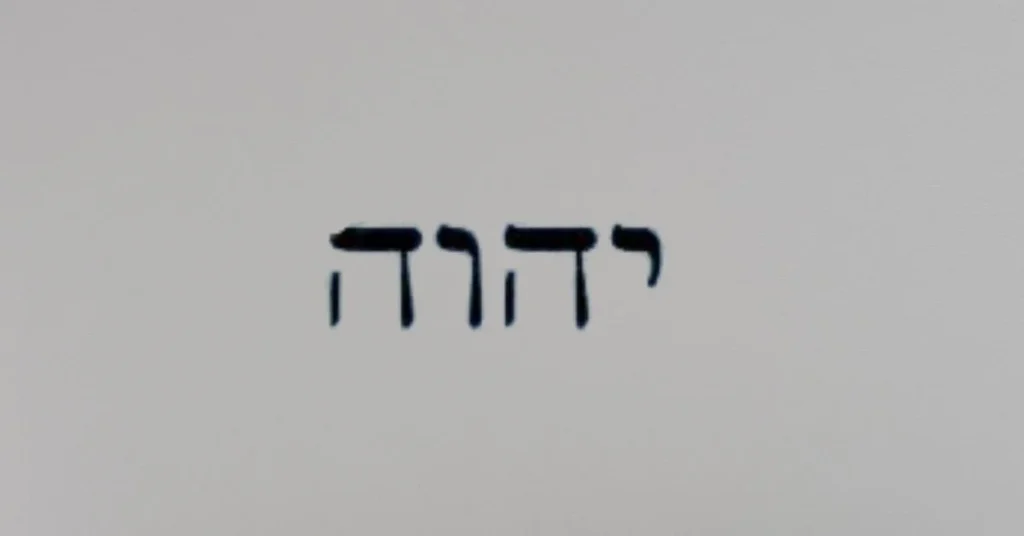More and more, people who are deeply committed to getting back to the foundations of biblical truth are bringing up the name Yahuah in debates about spirituality, theology, and scripture. Researchers and students of Hebrew origins generally agree that Yahuah, which is often associated with the Sacred Name Movement, is the original, unmodified name of the Almighty pronounced in ancient times. Some contend that the divine name lost much of its significance and authority since it was either omitted or replaced with terms like “Lord” or “God” as a result of translations, cultural changes, and religious traditions that occurred over many centuries.
What Does Yahuah Mean?
For many, Yahuah (יהוה) is the right way to pronounce the Tetragrammaton, which is YHWH, the Hebrew name for the God of Israel. Although many versions capitalize “LORD” or call Him “Jehovah” or “Yahweh,” Christians and academics contend that Yahuah returns Him to His pristine original pronunciation and meaning.
Root Components of the Name:
- “Yah” – a short form used in praises (like Hallelu-Yah)
- “Hua” or “Huah” – possibly linked to “to be” or “He is”
In full, Yahuah can be interpreted as “He who exists” or “The self-existing one.”
Yahuah vs. Yahweh vs. Jehovah
Understanding the differences between Yahuah, Yahweh, and Jehovah is key to grasping how interpretations have evolved over time.
| Divine Name | Language/Origin | Pronunciation | Common Usage | Notes |
|---|---|---|---|---|
| Yahuah | Hebrew (Sacred Name Movement) | Yah-oo-ah | Used by those restoring the original name | Believed to be the most accurate form |
| Yahweh | Scholarly Hebrew Reconstruction | Yah-weh | Common in academic texts | May be a Greek-influenced version |
| Jehovah | Latinized Hebrew (Middle Ages) | Jeh-ho-vah | Popular in traditional Christianity | Created from mixing YHWH and Adonai |
| LORD (all caps) | English Bible Translations | — | Used to avoid pronouncing YHWH | Translation substitute, not original |
Biblical References to Yahuah
While modern Bibles often replace YHWH with “LORD,” ancient Hebrew texts contain the Tetragrammaton over 6,800 times. Examples include:
- Exodus 3:15 – “This is my name forever…”
- Psalm 83:18 – “That men may know that thou, whose name alone is Yahuah…”
These passages underscore the significance and sacredness of the divine name.

Why the Name Yahuah Matters Today
For many, using Yahuah is about restoring authenticity and honoring the Most High with His true name. It’s not just semantics—it’s spiritual intimacy. The choice to say Yahuah reflects a desire to:
- Return to original biblical truths
- Distinguish the Creator from man-made deities
- Reconnect with Hebraic roots
It also aligns with movements pushing back against religious traditions that have lost touch with scriptural foundations.
Pronunciation and Spelling Variations
Since Hebrew vowels were not written in early scriptures, the exact pronunciation was lost for centuries. However, modern linguistics and scriptural analysis support the pronunciation Yahuah, based on patterns seen in names like:
- Yahushua (Joshua)
- Yahu-natan (Jonathan)
- Eli-yahu (Elijah)
This pattern of “Yahu” being part of names tied to the Almighty adds credibility to the form “Yahuah.”
Sacred Name Movement and Beliefs
The Sacred Name Movement emphasizes the importance of using the original Hebrew names of God (Yahuah) and the Messiah (Yahusha). Key beliefs include:
- Rejection of Greek and Latin transliterations
- Observance of biblical feasts and Torah laws
- Distancing from man-made doctrines
While often controversial, this movement is growing, particularly among Hebrew Roots followers and Messianic believers.
Conclusion
When one seeks a deeper, more genuine connection with the Creator, the understanding and use of the name Yahuah becomes more than a historical curiosity—it becomes a profound spiritual conviction. Locating the holy name is, for many Christians, like finding a spiritual key that unlocks a door to a closer relationship with God.
Adopting the actual name Yahvah takes you to a higher level of respect, adoration, and comprehension, whether you’re looking at the Bible for the first time or are trying to strengthen your faith.
It questions long-held beliefs, promotes independent research, and changes your view of God from an impersonal, omnipotent being to a covenant-keeping, personally-present Elohim who makes Himself known to those who seek Him with all their heart.
FAQs
1. What is the correct pronunciation of Yahuah?
Most agree it is pronounced “Yah-oo-ah,” based on the structure of ancient Hebrew and how similar names were formed.
2. Is Yahuah the same as Yahweh?
They both refer to the Tetragrammaton (YHWH), but Yahuaah is believed to be a more accurate pronunciation by some Hebrew scholars and the Sacred Name Movement.
3. Why do most Bibles not use Yahuaah?
Out of tradition and reverence, most translations replace YHWH with “LORD” or “Jehovah,” though these are not original names.
4. Is using Yahuuah necessary for salvation?
While views vary, many Sacred Name believers feel it’s essential to call upon the Most High by His true name, as seen in scriptures like Joel 2:32.
5. Where can I learn more about Yahuaah?
Look into Hebrew Roots teachings, ancient Hebrew manuscripts, and communities focused on restoring biblical names and practices.
For more information, click here.









